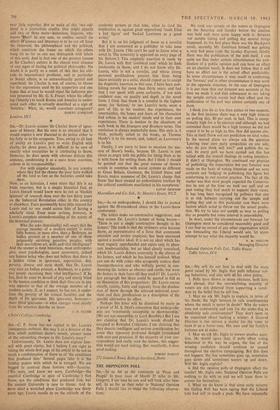SIR,—Cannot these matters be argued decently? The sharpneSs—even rudeness—of Dr.
Leavis was only about Sir Charles Snow's talents and tastes. That Sir Charles has many good personal qualities is evident from his friends' comments;. but I do not see why criticism of his literary or intellectual pre- tensions should be taken as reflecting on these. Sonic of the counter-attacks against Dr. Leavis in your issue of March 16 were a cesspool of disgraceful attributions of motive and low-grade psychoanalyis- at-a-distance. (And one is reminded by the Cherwell incident that Dr, Leavis is at least reserving his barbs for a living person capable of reply.) It is not at all as a Lcavisite that 1 venture a few comments: my concerns happen to overlap the controversy at several points, one of them crucial. No judge of novels myself (and in any case a single opinion would hardly interest you), I have always found that novelists, literary men and critics I know have always taken it for granted that Snow's novels are of no great value, whatever the lending library public may think. In fact, in a sense it is a pity that the demolition has to be carried out by Dr. Leavis, precisely because his reputation for rigour is so great that his views might be thought extreme ones not shared by more moderate people. But anyhow, as I understand it, Dr. Leavis was concerned less with the fairly obvious problem of the quality of the Snow books, than with the curious cultural phenomenon of their being taken seriously on a high level.
I wholly sympathise with Sir Charles's theiii that literary men often appear to be compulsively blind about science, and find it odd that any edu- cated man should not at least read the New Scientio and the Scientific American regularly, with how- ever little expertise. But to make of this 'two cul- tures' is a journalistic crudity. One might equally add two or three more—historians, linguists, who knows Itthat? In any case, to confine oneself (in effect) tarscience and literature is to be cut off from the historical, the philosophical and the political, which constitute the frame on which the others hang (in so far as one can distinguish with labels of this sort). And in fact one of the greatest lacunas in Sir Charles's culture is the almost total absence of any signs of feeling for political philosophy. No doubt it is partly as a result of this that his atti- tude to international problems, and in particular to Soviet affairs, is so extraordinarily partial and superficial. Sir Charles is not, of course, to blame for the expressions used by his supporters and one hopes that at least he would reject the ludicrous pic- ture presented by Mr. G. S. Fraser, where his affect- ing ('bluntly') to teach Russia and America to under- stand each other is actually described as a sign of 'humility.' What, sir, would constitute arrogance?















































 Previous page
Previous page